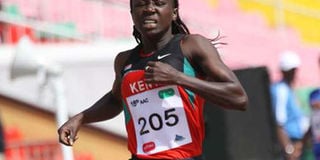Kenya doping bribe claims by banned runners

Joyce Zakari on her way to a third position during the 100metres heats at the Africa Senior championships in Addis Ababa on May 1, 2008. Francisca Koki, suspended for doping at the Beijing World Championships, said she and fellow runner Joyce Zakari were asked to pay nearly $50,000 in bribes to Athletics Kenya CEO Isaac Mwangi to help in their case. PHOTO | MOHAMMED AMIN |
What you need to know:
- Sprinters Koki and Zakari, suspended for doping violations at the Beijing World Championships, claimed Athletics Kenya chief executive officer Isaac Mwangi asked them for the bribe but they were unable to pay.
- "The two of us were asked to give Sh2.5 million ($24,000, 21,000 euros) each by the Athletics Kenya's Isaac Mwangi," Koki told AFP.
- The Athletics Kenya CEO Mwangi has denied the claims.
- Both Koki and Zakari were each given a four-year ban after being found guilty of using a prohibited substance, Furosemide, in Beijing in August 2015.
Top Kenyan athlete Francisca Koki, suspended for doping, said she and fellow runner Joyce Zakari were asked to pay nearly $50,000 in bribes to the national athletics federation chief to help the case.
Sprinters Koki and Zakari, suspended for doping violations at the Beijing World Championships, claimed Athletics Kenya chief executive officer Isaac Mwangi asked them for the bribe but they were unable to pay.
"The two of us were asked to give Sh2.5 million ($24,000, 21,000 euros) each by the Athletics Kenya's Isaac Mwangi," Koki told AFP.
"We could not afford such a big sum of money. For me I have never even seen such an amount.
I just started running recently and I have not been able to make much money." However, the AK CEO Mwangi has denied the claims.
FOUR-YEAR BAN
Both Koki and Zakari were each given a four-year ban after being found guilty of using a prohibited substance, Furosemide, in Beijing in August 2015.
Koki, a 400m hurdler, said she and Zakari were asked for cash in October, a month before their suspension.
"We thought it was unfair for an official to ask for money from us, especially when we were in such a kind of a desperate situation after we had been kept in a suspense for a long time before the four-year suspension was imposed on us," Koki said.
"We are crying for our case to be heard, because we believe many other athletes have been faced with the same dilemma."
She said she had spoken to IAAF officials on the matter.
Mwangi said he had spoken to both Koki and Zakari, but dismissed their claims he had asked for a bribe.
"It is not true that I asked for money from them," Mwangi insisted to AFP.
The success of Kenya at Beijing - topping the medals table for the first time since the championships started in 1983, taking seven golds, six silvers and three bronze medals - was tarnished after Koki and Zakari failed drugs tests.
DOPING HISTORY
After the pair tested positive in Beijing, Kenya's Deputy President William Ruto announced plans to criminalise doping.
Many in Kenya fear doping is rife among their top class runners, who have been the source of enormous national pride.
More than 40 Kenyan athletes have been suspended for doping in the past two years.
Other runners claim they have also been asked for cash to shorten their ban.
Family of a former top runner who has also been banned said the athlete was asked for "such a big amount", too much for them to pay.
AK SUSPENSIONS
In December, three top Athletics Kenya officials including president Isaiah Kiplagat, deputy president David Okeyo and former treasurer Joseph Kinyua were suspended by the IAAF ethics Commission for alleged corruption and covering up doping.
The IAAF Ethics Commission has appointed a Kenyan lawyer, Sharad Rao, to carry out investigations on the three officials.
The IAAF confirmed last November that ex-AK vice-president Okeyo had been under investigation by Kenyan police over allegations of doping cover-ups.
A German broadcaster had alleged that Kenya officials were extorting money from athletes and coaches to cover ups failed drug tests, in return for lenient doping bans.
Kenya, which is placed near the bottom of Transparency International's annual corruption index, coming in 145th out of 174, has long been blighted by graft.
In November, a dozen foreign diplomats representing Kenya's biggest donors criticised its failure to tackle the corruption "crisis" and threatened to impose travel bans on wrongdoers.





